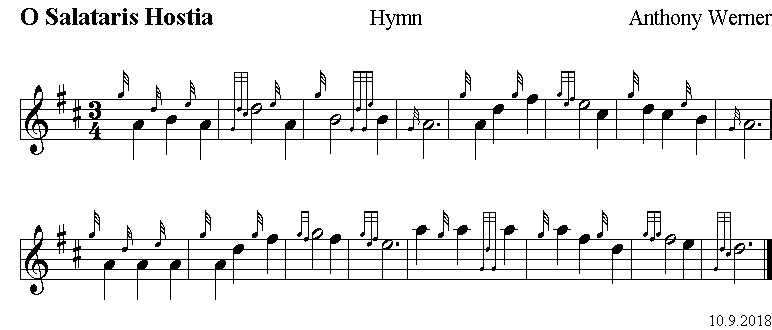|
O salutaris hostia (English O Saving Host) is
the penultimate stanza of the hymn Verbum supernum prodiens,
composed by St. Thomas Aquinas for the Hour of Lauds in the
Office of the Feast of Corpus Christi. This stanza and the final
stanza, or doxology (Uni trinoque Domino), have been
selected to form a separate hymn for Benediction of the Most
Blessed Sacrament. Usually, and most appropriately, it is begun
either when the door of the tabernacle is opened or when the
monstrance is being placed on the throne of exposition. The hymn
is often chosen as a motet for solemn Mass, and may thus be used
after the proper Offertory for the day has been sung or recited.
This popular melody was
written by Anthony Werner (1817-1866) in the mid-19th century.
The well-known melody of Tantum Ergo originated in a Stonyhurst
manuscript in 1751 and was arranged and published in London by
Samuel Webbe (1740–1816) in his Motets and Antiphons, 1792.
The text is by Thomas
Aquinas. Gregorio Allegri was an Italian priest, composer, and
tenor in the Papal Choir. Adoremus in Aeternum was the
concluding antiphon at Benediction of the Blessed Sacrament.
This well-known setting was adapted by Sir Richard Terry in the
late 19th century for use at Downside Abbey in England. The
verses are sung to Gregorian Psalm Tone I.

Verse 1
O salutaris Hostia
Quae caeli pandis ostium
Bella premunt hostilia
Da robur, fer auxilium
Verse 2
Uni Trinoque Domino
Sit sempterna gloria
Qui vitam sine termino
Nobis donet in patria |



